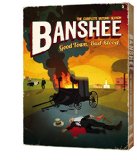| Reviews & Columns |
|
Reviews DVD TV on DVD Blu-ray 4K UHD International DVDs In Theaters Reviews by Studio Video Games Features Collector Series DVDs Easter Egg Database Interviews DVD Talk Radio Feature Articles Columns Anime Talk DVD Savant Horror DVDs The M.O.D. Squad Art House HD Talk Silent DVD
|
DVD Talk Forum |
|
|
| Resources |
|
DVD Price Search Customer Service #'s RCE Info Links |
|
Columns
|
|
|
Banshee: The Complete Second Season
HBO // Unrated // December 30, 2014
List Price: $39.98 [Buy now and save at Amazon]
The Season:
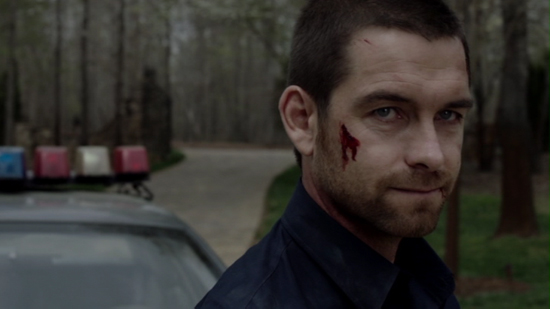
Banshee's all about the glory of excess. It's difficult to deny that now, especially after Cinemax's sophomore season: if there's an opportunity for blood to spill, skin to be shed, and drama to unravel within the small Pennsylvania town and its bizarrely high concentration of organized crime, then it's going to surface. The question ultimately becomes whether that's a good thing or not. While the neo-noir/western story of ex-convict Lucas Hood and his in-the-moment con job of pretending to be the area's recently-deceased sheriff still wages a battle with believability, the stakes become much smaller and concentrated in the aftermath of the last season's chaotic ending. A stronger focus on the characters and some newly-discovered relationships takes shape underneath the pulp and gore of this second season, dialing up the visceral energy generated by Hood's arrival -- arguably to an excessive degree -- while exploring different, if on-the-nose, paths taken by Banshee's citizens.
Everything about this run of Banshee hinges on blowback from last season (which should be viewed before continuing this review), the repercussions of its daring, law-breaking storm of the castle to rescue the unnamed protagonist now known as Sheriff Lucas Hood (Antony Starr) from Rabbit's (Ben Cross) clutches. Some, like most of the Banshee PD, get off light under the scrutiny of FBI agent Racine's (Zeljko Ivanek) inquisition over the matter; others, however, have to do the time befitting their crimes. As the rift widens in the Hopewell household following Carrie's (Ivana Milicevic) actions, Lucas gets back to work in the police department while also maintaining his robbery "side gig" by executing small heists with Job (Hoon Lee), Sugar (Frankie Faison) ... and Carrie. Being a threat to his livelihood whether he's wearing the badge or not, Lucas also decides to rededicate his attention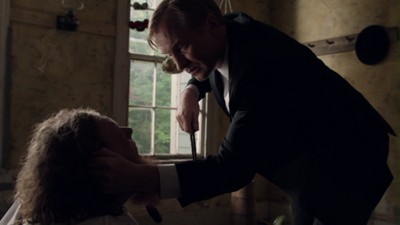 towards the dealings of the menacing ex-Amish mobster Kai Proctor (Ulrich Thomsen), whose activity with the local Kinaho Indian tribe, notably with newly-promoted chief Alex Longshadow (Anthony Ruivivar), has kicked further into gear following the literal collapse of their projected hotel. As if things weren't already a mess, Rabbit's undiscovered body leads to suspicion that he might, in fact, not be dead after all.
towards the dealings of the menacing ex-Amish mobster Kai Proctor (Ulrich Thomsen), whose activity with the local Kinaho Indian tribe, notably with newly-promoted chief Alex Longshadow (Anthony Ruivivar), has kicked further into gear following the literal collapse of their projected hotel. As if things weren't already a mess, Rabbit's undiscovered body leads to suspicion that he might, in fact, not be dead after all.
If someone's bothered by the fact that Hood's been able to hide under the radar of higher-level suspicion for this long as Banshee's sheriff, they're not going to get a whole lot of relief from this season; in fact, despite the show's efforts, the closeness in which Hood comes to being discovered might further aggravate. Instead, Banshee's strengths come in what the writing's able to accomplish in spite of the premise's dubiousness: the motivation behind Sheriff Hood's willingness to continue doing his job despite the imminence of getting discovered, and showcasing the repercussions of his renegade, often self-serving brand of law enforcement. Once again, some of this season's best moments emerge around how Hood's responses to the demands of authority and the limits of the law actively subvert what's expected of a traditional peacekeeper, from shirking jurisdiction boundaries to turning a blind eye from (perhaps even encouraging) torture and excessive violence in the pursuit of justice. Or comeuppance, depending on who you ask.
Much like Sheriff Hood's perspective on the law, Banshee isn't really that concerned with restraint. Lengthy, hard-hitting fistfights and lopsided firearm duels are even more common this time around, with Hood's knack for getting repeatedly bloodied even becoming a gag in the police department. While elevating the pulse for each episode's near-hour stretch, these scenes tend to go on too long for their own good, leading either to momentum fatigue or the brutality going above and beyond what's necessary. That over-the-top tempo isn't just in the violence, though: the writing also brusquely explores themes of religion and racism, leading into superficial plot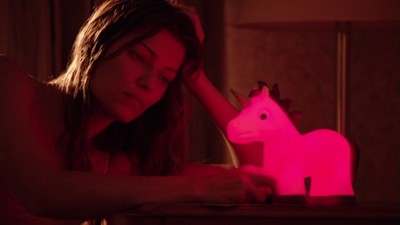 conflicts and over-the-top speeches that feel tacked on instead of like organic elements of small-town ignorance. Together with the storytelling style's consistent usage of parallel events being intercut with each other for thematic purpose -- for instance, a female cop and a female inmate in separate fistfights with a similar "survival" motif -- and you've got a series that tends to push buttons too hard and at incongruous times, largely for shock value. What could be seen as ways to expand Banshee's depth instead end up weakening it.
conflicts and over-the-top speeches that feel tacked on instead of like organic elements of small-town ignorance. Together with the storytelling style's consistent usage of parallel events being intercut with each other for thematic purpose -- for instance, a female cop and a female inmate in separate fistfights with a similar "survival" motif -- and you've got a series that tends to push buttons too hard and at incongruous times, largely for shock value. What could be seen as ways to expand Banshee's depth instead end up weakening it.
The areas where Banshee grows can be found in how the medley of characters navigate the small Pennsylvania town and its dark idiosyncrasies, how criminals persevere in this limiting but brazen community and police officers cope with the limitations of their service. Interestingly, we get to know Hood better while learning almost nothing new about him over the course of this season, where his actions and reactions as the sheriff reveal more about him as a person -- his limits, his weaknesses, and his motivations -- than we'd probably learn through revelations about his backstory. Hood and Carrie's relationship remain just as complicated, something that gets explored at-length in a slower-paced and outside-the-box road trip episode involving the two, yet a new kinship develops between the sheriff and deputy Siobhan (Trieste Kelly Dunn) that takes both their personalities in exciting new directions; the things learned about Siobhan and her overall character development yield surprisingly strong and nuanced results. While Kai Proctor's character growth predictably revolves around squeezing the Kinaho community in volatile ways, coupled with his discipline in martial arts and his emotional side emerging with increased family interaction, his niece Rebecca (Lili Simmons) starts to really come into her own as a morally-confused seeker or power and pleasure whose machinations and endgames remain unpredictable.
Family has always been the heart of Banshee, a theme that shines brighter with comparatively smaller-scale, acute personal drama in the show's second season. It becomes more about serialized responses to permanent fixtures in the small Pennsylvania town -- individuals, communities, and places -- than an overarching plot, focused on the evolution of relationships in the wake of the overt suspense from the premiere season. The waning stability and power shifts of Banshee's crime syndicate generates its own suspense, in tandem with how the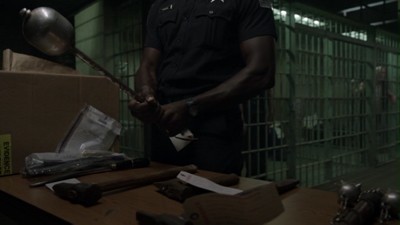 Banshee PD pokes and prods those things into action, crafting a chaotic setting that's increasingly hazardous for either law enforcement or for families like Carrie's. Building off that, Banshee also smartly works in the idea of whether it's time for some of these characters to move on and abandon hopes of returning to the lives they once had, relishing the gift of a second chance as an opportunity to make "something better". Granted, that's traditional ex-con themes at work, but the writing brings a lot of authentic, albeit occasionally melodramatic, soul to these ideas, and it's not exclusive to the good guys.
Banshee PD pokes and prods those things into action, crafting a chaotic setting that's increasingly hazardous for either law enforcement or for families like Carrie's. Building off that, Banshee also smartly works in the idea of whether it's time for some of these characters to move on and abandon hopes of returning to the lives they once had, relishing the gift of a second chance as an opportunity to make "something better". Granted, that's traditional ex-con themes at work, but the writing brings a lot of authentic, albeit occasionally melodramatic, soul to these ideas, and it's not exclusive to the good guys.
There are limits to the longevity and untapped potential of Banshee's premise, though, symptoms of which can be spotted in how the show resorts to rehashing elements of last season in order to generate a more blatant pulse of tension for this one's curtain call. There's a point late in the season where it becomes obvious that the writers are taking the show down a very similar path -- a Return of the Jedi moment, if you will -- and despite the stealth of silenced firearms and blades getting interrupted with an emotional rain of bullets, it's wearisome to see that the show didn't feel comfortable finishing off the season within the confines of its scaled-down scope. It ends in a mixed, chaotic bag of violence and camaraderie that one might expect of this show, delivering a lethal dose of ham-fisted casualty apparently designed to shake things up for the next season ... and to, one final time, shake the audience up. Despite the excess, however, Banshee cautiously stays true to how the characters have evolved over this season, with an ending that bodes well for Hood and his gallery of peacekeepers and knaves to have the freedom to continue doing so.
The DVD:
Banshee: The Complete Season Season arrives from Warner/HBO Home Entertainment in a four-disc clear case with a series of hinged trays, just like the first season, where all of the discs sports the same white-on-orange textual design. Inner artwork features a shot of Hood aiming a pistol on one side, while the other side contains an episode and special features rundown. A fine matte slipcover with raised letters replicates the outer artwork.
Video and Audio:
Banshee's second season is a notch darker than the first, operating more at nighttime and in dimmer interiors than before. Aside from that mild difference, however, and I mean mild, the collection of 1.78-1-framed, 16x9 enhanced transfers from Warner Bros/HBO are equally as exquisite as the first season, with an unpredictable, free-form mix of low-saturation, brightly-lit, high-contrast and shadows sequences depending on the show's mood. Skin tones are appropriately warm or cool in response to the color temperature, while vivid greens of foliage and vibrant colors in Native American tapestries pop from the image. Contrast can be difficult at times in the really low-light sequences, but the disc does an admirable job of keeping details looming in shadows as visible as possible. Some brighter light sources experience a bit of bleeding, such as the lights of the Cadillac police station and the red glowing unicorn. Fine details in garments and face textures, along with the subtle sheen of light against skin, reveal a highly-capable disc that tries its damndest to match the capabilities of its broadcast source.
The audio quality for each and every episode of Banshee is, once again, stellar as well in their 5.1 Dolby Digital presentations. The surround activity frequently immerses those watching in the sights and sounds of a quaint rural town, especially night bugs chirping, while the louder bustle of Sugar's bar and Proctor's strip club persistently test the rear channels alongside the show's emotive scoring. Rigorous effects like the skidding of an eighteen-wheeler truck and a massive, fiery explosion of a ramshackle mill show off some keen separation in all direction and into the bass registry, while hand-to-hand combat and the thump of silenced bullets offer shrewd moments of front-dedicated separation. Subtler effects -- the tapping of high-heel shoes, the grinding of meat, the clank of a whisky glass on a bartop -- are clean and satisfying, slightly muffled here and there but never without the proper atmosphere. Dialogue is tack-sharp and constantly aware of front-channel separation, too, always audible and never noticeably artificial in tenor. Fantastic stuff. English, French, Spanish, and Portuguese subs are available along with the English 5.1 track.
Special Features:
Just like the first season, Banshee: The Complete Second Season also comes with a slate of five Audio Commentaries for scattered episodes across the series -- The Thunder Man; The Warrior Class; The Truth About Unicorns; Ways to Bury a Man; and Bullets and Tears -- with a broad range of participants, remaining mostly casual and conversational in tone. Show producers Jonathan Tropper and Greg Yaitanes reserve their full participation for the series finale, where they discuss incorporating the prequel comic book's content into the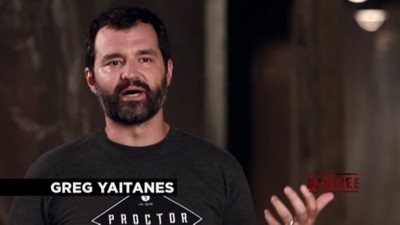 episode and how the events that transpire later on do, in fact, give fuel for the fire driving the third season. The rest are kinda touch and go, but they have their moments: the all-female commentary for The Thunder Man touches on how the actresses handle the show's nudity, while the producers and director involved in The Truth About Unicorns dissect the "emotional journey" and figurative dream-sequence shots of the run's slowest and methodically evocative episode (each participant recorded their input in four separate locations, to the track's detriment).
episode and how the events that transpire later on do, in fact, give fuel for the fire driving the third season. The rest are kinda touch and go, but they have their moments: the all-female commentary for The Thunder Man touches on how the actresses handle the show's nudity, while the producers and director involved in The Truth About Unicorns dissect the "emotional journey" and figurative dream-sequence shots of the run's slowest and methodically evocative episode (each participant recorded their input in four separate locations, to the track's detriment).
Once again, the folks at Cinemax have thrown in the series of Banshee: Origins (44:30, 16x9 HD) webisodes, and once again, it's tough to tell whether this stretch of material crosses the line from entertaining curiosities to downright essential information about the series. Either way, that's a good thing: reaching back seventeen (17) years, the twelve chapters fill in certain gaps within the Banshee mythos, mostly around how certain characters discovered information they're already armed with in the series and how relationships were taken up a few steps in the past. The crucial ones come early on in a lengthy string of episodes featuring Hood's arrest and a negotiation for a testimony, snips of which appear in the series proper, while glimpses at Gordon and Carrie's initial meeting and the strengthening of Sugar and Proctor's relationship deepens perceptions of everything that's going on. Most episodes (1-4; 6-8) also come with brief Zoomed In glimpses at how specific scenes were conceptualized, as well as Deleted Scenes. Rounding out the supplements are an extended Conversation Between Olek and The Albino (1:330, 16x9) from Banshee Origins, and a series of three Trailers (5:31, 16x9).
Final Thoughts:
Despite staying a few strides back from greatness across its premiere season, Banshee's become a thrilling, emotionally involving callback to westerns and noirs filtered through a balls-to-the-wall style that relishes its visceral pursuits. In the second season, the show takes both a few steps forward and a few steps back, landing in about the same place on the cusp of quality. Smaller, more intimate dramatic plots involving Lucas Hood's outlandish long-con and the relationships influenced by his situation give the story even more soul, while the dangerous but ultimately lower-tier precariousness of Kai Proctor's organized crime pursuits generate suspense that's both restrained and impactful. That said, the show also attempts to bite off more than it can chew with its elevated pulpy delights -- countless damaging brawls, purpose-driven deaths, heavy-handed shots at different adult themes -- resulting in a show that tries a little too hard to provoke and pleasure its audience, then defaults to other recycled elements that make it feel a tad lost for creativity in other areas. Still a load of pulpy fun, though, and it'll get even better with a bit of restraint placed on its excess. Strongly Recommended.
Thomas Spurlin, Staff Reviewer -- DVDTalk Reviews | Personal Blog/Site

Banshee's all about the glory of excess. It's difficult to deny that now, especially after Cinemax's sophomore season: if there's an opportunity for blood to spill, skin to be shed, and drama to unravel within the small Pennsylvania town and its bizarrely high concentration of organized crime, then it's going to surface. The question ultimately becomes whether that's a good thing or not. While the neo-noir/western story of ex-convict Lucas Hood and his in-the-moment con job of pretending to be the area's recently-deceased sheriff still wages a battle with believability, the stakes become much smaller and concentrated in the aftermath of the last season's chaotic ending. A stronger focus on the characters and some newly-discovered relationships takes shape underneath the pulp and gore of this second season, dialing up the visceral energy generated by Hood's arrival -- arguably to an excessive degree -- while exploring different, if on-the-nose, paths taken by Banshee's citizens.
Everything about this run of Banshee hinges on blowback from last season (which should be viewed before continuing this review), the repercussions of its daring, law-breaking storm of the castle to rescue the unnamed protagonist now known as Sheriff Lucas Hood (Antony Starr) from Rabbit's (Ben Cross) clutches. Some, like most of the Banshee PD, get off light under the scrutiny of FBI agent Racine's (Zeljko Ivanek) inquisition over the matter; others, however, have to do the time befitting their crimes. As the rift widens in the Hopewell household following Carrie's (Ivana Milicevic) actions, Lucas gets back to work in the police department while also maintaining his robbery "side gig" by executing small heists with Job (Hoon Lee), Sugar (Frankie Faison) ... and Carrie. Being a threat to his livelihood whether he's wearing the badge or not, Lucas also decides to rededicate his attention
 towards the dealings of the menacing ex-Amish mobster Kai Proctor (Ulrich Thomsen), whose activity with the local Kinaho Indian tribe, notably with newly-promoted chief Alex Longshadow (Anthony Ruivivar), has kicked further into gear following the literal collapse of their projected hotel. As if things weren't already a mess, Rabbit's undiscovered body leads to suspicion that he might, in fact, not be dead after all.
towards the dealings of the menacing ex-Amish mobster Kai Proctor (Ulrich Thomsen), whose activity with the local Kinaho Indian tribe, notably with newly-promoted chief Alex Longshadow (Anthony Ruivivar), has kicked further into gear following the literal collapse of their projected hotel. As if things weren't already a mess, Rabbit's undiscovered body leads to suspicion that he might, in fact, not be dead after all. If someone's bothered by the fact that Hood's been able to hide under the radar of higher-level suspicion for this long as Banshee's sheriff, they're not going to get a whole lot of relief from this season; in fact, despite the show's efforts, the closeness in which Hood comes to being discovered might further aggravate. Instead, Banshee's strengths come in what the writing's able to accomplish in spite of the premise's dubiousness: the motivation behind Sheriff Hood's willingness to continue doing his job despite the imminence of getting discovered, and showcasing the repercussions of his renegade, often self-serving brand of law enforcement. Once again, some of this season's best moments emerge around how Hood's responses to the demands of authority and the limits of the law actively subvert what's expected of a traditional peacekeeper, from shirking jurisdiction boundaries to turning a blind eye from (perhaps even encouraging) torture and excessive violence in the pursuit of justice. Or comeuppance, depending on who you ask.
Much like Sheriff Hood's perspective on the law, Banshee isn't really that concerned with restraint. Lengthy, hard-hitting fistfights and lopsided firearm duels are even more common this time around, with Hood's knack for getting repeatedly bloodied even becoming a gag in the police department. While elevating the pulse for each episode's near-hour stretch, these scenes tend to go on too long for their own good, leading either to momentum fatigue or the brutality going above and beyond what's necessary. That over-the-top tempo isn't just in the violence, though: the writing also brusquely explores themes of religion and racism, leading into superficial plot
 conflicts and over-the-top speeches that feel tacked on instead of like organic elements of small-town ignorance. Together with the storytelling style's consistent usage of parallel events being intercut with each other for thematic purpose -- for instance, a female cop and a female inmate in separate fistfights with a similar "survival" motif -- and you've got a series that tends to push buttons too hard and at incongruous times, largely for shock value. What could be seen as ways to expand Banshee's depth instead end up weakening it.
conflicts and over-the-top speeches that feel tacked on instead of like organic elements of small-town ignorance. Together with the storytelling style's consistent usage of parallel events being intercut with each other for thematic purpose -- for instance, a female cop and a female inmate in separate fistfights with a similar "survival" motif -- and you've got a series that tends to push buttons too hard and at incongruous times, largely for shock value. What could be seen as ways to expand Banshee's depth instead end up weakening it. The areas where Banshee grows can be found in how the medley of characters navigate the small Pennsylvania town and its dark idiosyncrasies, how criminals persevere in this limiting but brazen community and police officers cope with the limitations of their service. Interestingly, we get to know Hood better while learning almost nothing new about him over the course of this season, where his actions and reactions as the sheriff reveal more about him as a person -- his limits, his weaknesses, and his motivations -- than we'd probably learn through revelations about his backstory. Hood and Carrie's relationship remain just as complicated, something that gets explored at-length in a slower-paced and outside-the-box road trip episode involving the two, yet a new kinship develops between the sheriff and deputy Siobhan (Trieste Kelly Dunn) that takes both their personalities in exciting new directions; the things learned about Siobhan and her overall character development yield surprisingly strong and nuanced results. While Kai Proctor's character growth predictably revolves around squeezing the Kinaho community in volatile ways, coupled with his discipline in martial arts and his emotional side emerging with increased family interaction, his niece Rebecca (Lili Simmons) starts to really come into her own as a morally-confused seeker or power and pleasure whose machinations and endgames remain unpredictable.
Family has always been the heart of Banshee, a theme that shines brighter with comparatively smaller-scale, acute personal drama in the show's second season. It becomes more about serialized responses to permanent fixtures in the small Pennsylvania town -- individuals, communities, and places -- than an overarching plot, focused on the evolution of relationships in the wake of the overt suspense from the premiere season. The waning stability and power shifts of Banshee's crime syndicate generates its own suspense, in tandem with how the
 Banshee PD pokes and prods those things into action, crafting a chaotic setting that's increasingly hazardous for either law enforcement or for families like Carrie's. Building off that, Banshee also smartly works in the idea of whether it's time for some of these characters to move on and abandon hopes of returning to the lives they once had, relishing the gift of a second chance as an opportunity to make "something better". Granted, that's traditional ex-con themes at work, but the writing brings a lot of authentic, albeit occasionally melodramatic, soul to these ideas, and it's not exclusive to the good guys.
Banshee PD pokes and prods those things into action, crafting a chaotic setting that's increasingly hazardous for either law enforcement or for families like Carrie's. Building off that, Banshee also smartly works in the idea of whether it's time for some of these characters to move on and abandon hopes of returning to the lives they once had, relishing the gift of a second chance as an opportunity to make "something better". Granted, that's traditional ex-con themes at work, but the writing brings a lot of authentic, albeit occasionally melodramatic, soul to these ideas, and it's not exclusive to the good guys. There are limits to the longevity and untapped potential of Banshee's premise, though, symptoms of which can be spotted in how the show resorts to rehashing elements of last season in order to generate a more blatant pulse of tension for this one's curtain call. There's a point late in the season where it becomes obvious that the writers are taking the show down a very similar path -- a Return of the Jedi moment, if you will -- and despite the stealth of silenced firearms and blades getting interrupted with an emotional rain of bullets, it's wearisome to see that the show didn't feel comfortable finishing off the season within the confines of its scaled-down scope. It ends in a mixed, chaotic bag of violence and camaraderie that one might expect of this show, delivering a lethal dose of ham-fisted casualty apparently designed to shake things up for the next season ... and to, one final time, shake the audience up. Despite the excess, however, Banshee cautiously stays true to how the characters have evolved over this season, with an ending that bodes well for Hood and his gallery of peacekeepers and knaves to have the freedom to continue doing so.
The DVD:
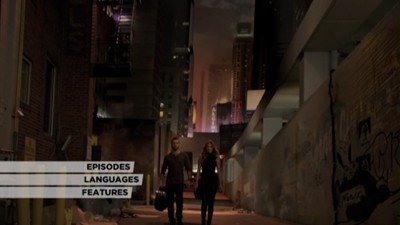 | 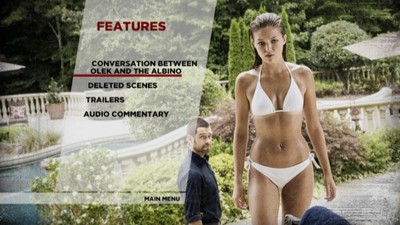 |
Banshee: The Complete Season Season arrives from Warner/HBO Home Entertainment in a four-disc clear case with a series of hinged trays, just like the first season, where all of the discs sports the same white-on-orange textual design. Inner artwork features a shot of Hood aiming a pistol on one side, while the other side contains an episode and special features rundown. A fine matte slipcover with raised letters replicates the outer artwork.
Video and Audio:
Banshee's second season is a notch darker than the first, operating more at nighttime and in dimmer interiors than before. Aside from that mild difference, however, and I mean mild, the collection of 1.78-1-framed, 16x9 enhanced transfers from Warner Bros/HBO are equally as exquisite as the first season, with an unpredictable, free-form mix of low-saturation, brightly-lit, high-contrast and shadows sequences depending on the show's mood. Skin tones are appropriately warm or cool in response to the color temperature, while vivid greens of foliage and vibrant colors in Native American tapestries pop from the image. Contrast can be difficult at times in the really low-light sequences, but the disc does an admirable job of keeping details looming in shadows as visible as possible. Some brighter light sources experience a bit of bleeding, such as the lights of the Cadillac police station and the red glowing unicorn. Fine details in garments and face textures, along with the subtle sheen of light against skin, reveal a highly-capable disc that tries its damndest to match the capabilities of its broadcast source.
The audio quality for each and every episode of Banshee is, once again, stellar as well in their 5.1 Dolby Digital presentations. The surround activity frequently immerses those watching in the sights and sounds of a quaint rural town, especially night bugs chirping, while the louder bustle of Sugar's bar and Proctor's strip club persistently test the rear channels alongside the show's emotive scoring. Rigorous effects like the skidding of an eighteen-wheeler truck and a massive, fiery explosion of a ramshackle mill show off some keen separation in all direction and into the bass registry, while hand-to-hand combat and the thump of silenced bullets offer shrewd moments of front-dedicated separation. Subtler effects -- the tapping of high-heel shoes, the grinding of meat, the clank of a whisky glass on a bartop -- are clean and satisfying, slightly muffled here and there but never without the proper atmosphere. Dialogue is tack-sharp and constantly aware of front-channel separation, too, always audible and never noticeably artificial in tenor. Fantastic stuff. English, French, Spanish, and Portuguese subs are available along with the English 5.1 track.
Special Features:
Just like the first season, Banshee: The Complete Second Season also comes with a slate of five Audio Commentaries for scattered episodes across the series -- The Thunder Man; The Warrior Class; The Truth About Unicorns; Ways to Bury a Man; and Bullets and Tears -- with a broad range of participants, remaining mostly casual and conversational in tone. Show producers Jonathan Tropper and Greg Yaitanes reserve their full participation for the series finale, where they discuss incorporating the prequel comic book's content into the
 episode and how the events that transpire later on do, in fact, give fuel for the fire driving the third season. The rest are kinda touch and go, but they have their moments: the all-female commentary for The Thunder Man touches on how the actresses handle the show's nudity, while the producers and director involved in The Truth About Unicorns dissect the "emotional journey" and figurative dream-sequence shots of the run's slowest and methodically evocative episode (each participant recorded their input in four separate locations, to the track's detriment).
episode and how the events that transpire later on do, in fact, give fuel for the fire driving the third season. The rest are kinda touch and go, but they have their moments: the all-female commentary for The Thunder Man touches on how the actresses handle the show's nudity, while the producers and director involved in The Truth About Unicorns dissect the "emotional journey" and figurative dream-sequence shots of the run's slowest and methodically evocative episode (each participant recorded their input in four separate locations, to the track's detriment). Once again, the folks at Cinemax have thrown in the series of Banshee: Origins (44:30, 16x9 HD) webisodes, and once again, it's tough to tell whether this stretch of material crosses the line from entertaining curiosities to downright essential information about the series. Either way, that's a good thing: reaching back seventeen (17) years, the twelve chapters fill in certain gaps within the Banshee mythos, mostly around how certain characters discovered information they're already armed with in the series and how relationships were taken up a few steps in the past. The crucial ones come early on in a lengthy string of episodes featuring Hood's arrest and a negotiation for a testimony, snips of which appear in the series proper, while glimpses at Gordon and Carrie's initial meeting and the strengthening of Sugar and Proctor's relationship deepens perceptions of everything that's going on. Most episodes (1-4; 6-8) also come with brief Zoomed In glimpses at how specific scenes were conceptualized, as well as Deleted Scenes. Rounding out the supplements are an extended Conversation Between Olek and The Albino (1:330, 16x9) from Banshee Origins, and a series of three Trailers (5:31, 16x9).
Final Thoughts:
Despite staying a few strides back from greatness across its premiere season, Banshee's become a thrilling, emotionally involving callback to westerns and noirs filtered through a balls-to-the-wall style that relishes its visceral pursuits. In the second season, the show takes both a few steps forward and a few steps back, landing in about the same place on the cusp of quality. Smaller, more intimate dramatic plots involving Lucas Hood's outlandish long-con and the relationships influenced by his situation give the story even more soul, while the dangerous but ultimately lower-tier precariousness of Kai Proctor's organized crime pursuits generate suspense that's both restrained and impactful. That said, the show also attempts to bite off more than it can chew with its elevated pulpy delights -- countless damaging brawls, purpose-driven deaths, heavy-handed shots at different adult themes -- resulting in a show that tries a little too hard to provoke and pleasure its audience, then defaults to other recycled elements that make it feel a tad lost for creativity in other areas. Still a load of pulpy fun, though, and it'll get even better with a bit of restraint placed on its excess. Strongly Recommended.
|
| Popular Reviews |
| Sponsored Links |
|
|
| Sponsored Links |
|
|
| Release List | Reviews | Shop | Newsletter | Forum | DVD Giveaways | Blu-Ray | Advertise |
|
Copyright 2024 DVDTalk.com All Rights Reserved. Legal Info, Privacy Policy, Terms of Use,
Manage Preferences,
Your Privacy Choices | |||||||









